Ven. Pomnyun Sunim’ Visit to North Korea
Today, Ven. Pomnyun Sunim had a meeting in which he discussed the future vision and business of the Jungto Society with the members of the Jungto Society Planning Committee.
Since morning, the planning committee had been holding group discussions on “the stature and role of the 1000-Day Practice participants” and “the goals of the 1st 10,000-Day Practice and the Happiness Center.” After being briefed about the results of the discussion, Ven. Pomnyun Sunim shared his thoughts on the topics discussed.
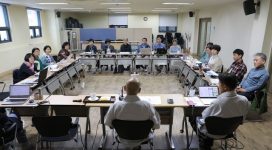
The planning committee was very curious about Ven. Pomnyun Sunim’s visit to North Korea between May 3 and May 7, 2019. Ven. Pomnyun Sunim briefly shared his experiences in North Korea.

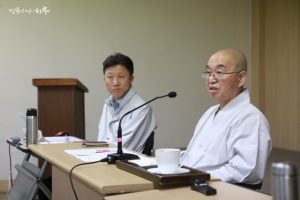

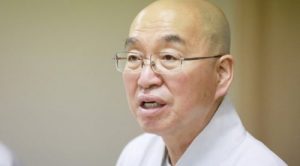
“I had a good visit. During the five days in North Korea, I was active from 6AM to 10PM in my monk’s robe. North Korean people pointed at me and said, “It’s a monk!” The elderly were more respectful towards me.
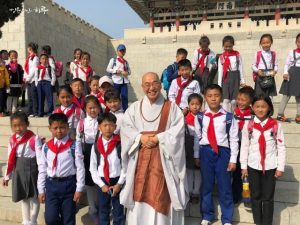
They asked me to take pictures with them and also to shake my hand. (Everyone laughs)
I visited Pyongyang, Pyeongnam, Pyeongbuk, and Gangwon, where people were busy getting ready for the farming season. Although I had limited access to certain areas, North Korean society gave off an overall impression of being clean and neat. Also, maybe because of their efforts to do everything independently without relying on a foreign power, I felt a sense of vibrancy in North Korea. However, I witnessed that there were many areas that seemed to be struggling due to the lack of food supplies.
Member of the upper class didn’t seem to have any worries about their food supplies since the government takes care of them, and the ordinary citizens are able to make a living through the market. The people who struggle the most are the ones outside the care of the government, so it’s not even possible to gauge how much hardship they are experiencing. The people who are suffering the most severe food shortage are said to be those working for mining companies. The big mining companies with tens of thousands of laborers are the ones experiencing the most difficulty.
Rock mines, coal mines, iron mines, and other such mines are under economic sanctions and cannot export their goods, so their revenue has reduced drastically. Because the companies that previously exported coal are no longer able to do so, they have to sell their coal to domestic thermal power stations. As a result, their revenue has been cut by more than half compared to what they had made exporting coal to other countries, so they cannot afford to buy enough food to feed their workers. The laborers are complaining that they cannot work because they don’t have enough to eat. Hearing such stories made me realize the severity of the food shortage situation. In North Korea, people thanked me multiple times for sending them food provisions at a time that they are so badly needed.
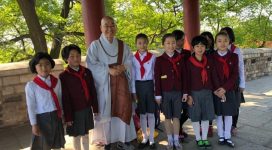
According to the UN Agency World Food Programme (WFP)’s report, 136 million tons of food are needed to solve the food shortage problem in North Korea. There is an overall food shortage in the country, but the people working at mining companies are experiencing the most severe food shortage because the economic sanctions are preventing the mining companies from exporting their products. The situation must have been very urgent for them to request help from us.
I was told, “Things won’t be so bad in July when we harvest the potatoes. But we need immediate help in order to survive from now until the end of June.”
When I told them that JTS is an organization that helps children, they said,
“Forty percent of the people in mining towns are children and youths. By supporting the mining town, you will be helping the children.”
In the mining town live families that include children and elders. Since both the laborers and their families are eligible for food aid, helping the mining towns can be considered as helping children.
JTS received permission from the Ministry of Unification of South Korea to provide 10,000 tons of corn in humanitarian aid to North Korea. JTS has sent 2,360 tons of corn to North Korea so far.
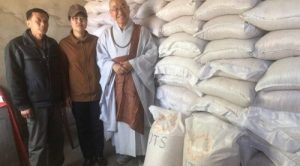
Visit to the mining town food distribution center. Two hundred tons of corn have safely arrived.
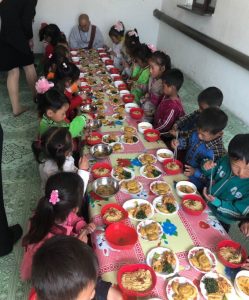
Children in a mining town eating food made from corn provided by JTS
I would really like for JTS to send an additional 20,000 tons of corn. To make that possible, we need to conduct fundraising campaigns. How about we begin the fundraising campaign on Buddha’s birthday?
Because North Korea fired missiles a few days ago, public opposition to humanitarian food aid to North Korea may grow. However, I think it is very meaningful for us to actively help the people of North Korea when they are experiencing such difficulties. Whether North Korea shoots missiles or not, it does not change the fact that North Koreans are starving. We believe in providing help when others don’t. We should not be overly influenced by the social climate.”
Upon Sunim’s suggestion, the Jungto Society Planning Committee agreed to conduct a fundraising campaign to provide corn to North Korea starting on Buddha’s birthday.
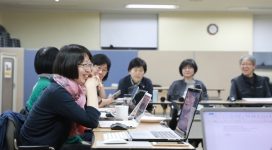
Tomorrow, on the day before the Buddha’s birthday, the lantern lighting ceremony will be held in the front yard of Seocho-dong Jungto Meeting Hall.
The Buddha said, “Giving food to the hungry is equal to presenting an offering to the Buddha.” As we celebrate the Buddha’s birthday, we pray that the food aid will be delivered to the Korean people as soon as possible


